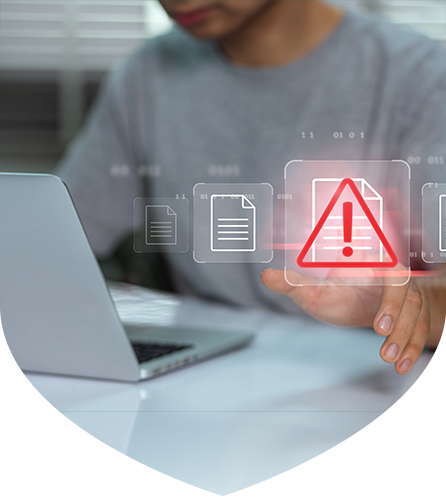Financial Wellness
12 Ways to Protect Yourself and Your Accounts Online
In 2024, American consumers lost over $12.5 billion to scams, according to the FBI: "Online criminals continue to adapt and increase their sophistication, targeting consumers and financial institutions with evolving tactics."
Don't become a statistic. Here are 12 smart tips to help safeguard your identity and financial accounts online.
Don't become a statistic. Here are 12 smart tips to help safeguard your identity and financial accounts online.
Be careful what you click
Many cyber-attacks start with phishing emails that trick you into revealing sensitive information, like passwords, Social Security numbers, or credit card details. If scammers obtain this data, they can exploit it on legitimate sites or launch malware on your device. If you see an unfamiliar or untrustworthy link, avoid clicking it.- Avoid clicking unknown links or attachments in emails, texts, and social media messages.
- Confirm that websites are legitimate by checking URLs and looking for "https" for secure connections.
Monitor your accounts regularly
Regular monitoring helps you catch suspicious activity early.- Examine statements for unfamiliar activity at least weekly; daily is even better.
- Set up transaction alerts for instant notifications of account changes or purchases.
- Report suspicious transactions to your financial institution immediately.
Strengthen your passwords
Creating strong passwords is your first line of defense against unauthorized access.- Use complex and unique passwords of at least 12 characters and choose a combination of letters, numbers, and symbols.
- Never share passwords or use the same password across multiple accounts.
- A password manager can securely store and generate strong passwords for each account.
- Click here for tips on making hack-proof passwords.
Use two-factor authentication
A password is not enough to keep you safe online anymore. 2FA (sometimes called two-step verification or multi-factor authentication) is a good idea for email, social media, online shopping, and financial services accounts, as well as gaming and streaming entertainment services.- 2FA adds an extra security step, usually involving a code you get by text or email, or from an authenticator app or security key.
- It could also require you to verify yourself via your fingerprint, face, or retina.
- Set up 2FA on all financial, email, and mobile accounts to block unauthorized access.
Be cautious with urgent messages
Scammers often create a push for you to get things done quickly. Keep these points in mind:- Always verify claims using official contact information.
- Pause before responding to any urgent requests.
Be careful using online card payments
While making transactions with a credit or debit card is convenient, it's important to take precautions to avoid card fraud.- Make a complex PIN for your cards to make it harder for scammers to guess.
- When making online card payments with your Tower debit or credit card, make sure to set up alerts and controls under Card Management in Digital Banking or in our mobile app. You can turn your card off temporarily and back on at any time, track transactions, receive alerts for foreign or large purchases, and more.
- You can also create text alerts for transaction types, transaction locations, and more, so you can immediately act on any suspicious activity.
Did you know?
You can set up a real-time alert to receive a notification anytime your Digital Banking account is accessed. It's another safeguard that lets you respond quickly to any unusual activity. To set up the alert, log in to Digital Banking or our mobile app, and go to Alerts & Notifications > Authentication > Digital Banking Access.
Keep software updated
Keep your device's operating system, browsers, antivirus, and other software up to date with the latest or daily security patches.- Update systems on all your devices—including mobile phones, tablets, and laptops.
- Enable automatic updates for all devices to defend against vulnerabilities.
- Regularly check for updates manually if necessary, including banking apps and antivirus programs.
Protect your mobile devices
- Use strong unlock codes or biometric security on mobile phones and tablets.
- It's generally considered safer to use a banking app than a browser for accessing your financial accounts online.
- Always log out of financial accounts after use and clear browser history if using a shared device.
- Avoid making banking transactions on public Wi-Fi. If unavoidable, use a VPN (virtual private network).
Minimize sharing personal information online
- Limit details you post to social media and job sites, review privacy settings regularly.
- Never share sensitive information with untrusted contacts.
Beware of payment scams
- Be very cautious when sending money to people you haven't met in person.
- Never pay with gift cards, as scammers often request them for fraudulent transactions.
Freeze your credit if necessary
A credit freeze can prevent identity theft if your information is compromised.- A credit freeze stops thieves from opening new accounts in your name.
- It's free and can be temporarily lifted when needed—contact Equifax, Experian, or TransUnion.
- Reporting fraud helps protect yourself and others from scams.
- Make a report with the FTC and the FBI's Internet Crime Complaint Center.
- Keep detailed records of fraudulent incidents (dates, amounts, correspondence).
Resources: Money Talks News, Federal Trade Commission, Discover


